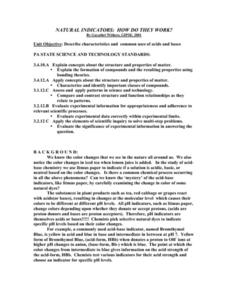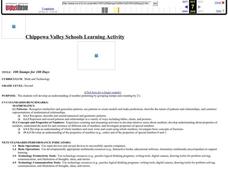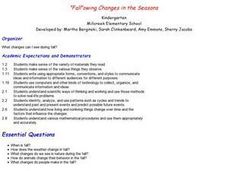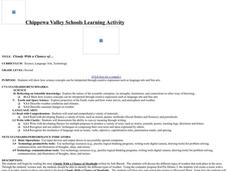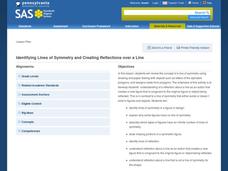Maryland Department of Education
The Concept of Diversity in World Literature Lesson 4: Proverbs
"Eneke the bird says since men have learnt to shoot without missing, he has learnt to fly without perching." As part of their study of Things Fall Apart, class members read Paul Hernadi and Francis Steen's essay, "The Tropical Landscapes...
Curated OER
Patterns
Second graders create an ABAB pattern with their name. In this early elementary math lesson, 2nd graders first model their names in an ABAB pattern with unifix cubes. They then recreate the pattern using letter stamps on KidPix.
Curated OER
Tessellations
Fifth graders investigate the relationship between math and art by examining patterns and polygons.They examine how polygons make up the patterns that form tessellations, and determine tessellations that occur in nature. Finally, they...
Curated OER
Take It Apart; Put It Together
Students design various items from recyclable materials. In this environmental friendly lesson, students study the construction of gift bags, envelopes and pocket folders and take them apart to make templates. Students construct their...
Curated OER
Natural Indicators: How Do They Work?
Students describe characteristics and common uses of acids and bases. They describe the role of natural indicators in the chemistry of acids and bases after testing and making observations on a variety of plant extracts. Students observe...
Curated OER
100 Stamps for 100 Days
Second graders count by 2's to get to 100. In this counting lesson plan, 2nd graders use the program Kid Pix to create stamps two at a time until they get to 100.
Curated OER
Cracker Design
Young scholars are presented with the following problem: A cracker manufacturer has been losing money and has to find a way to save her factory. They are given the task to design a new shape for the cracker manufacturer so that as...
Curated OER
Geo Jammin' By DeSign - Day 1, Lesson 1: Math in Motion
Second graders, through large screen monitor, study geometric design. They participate in a diagnostic assessment in which they use pnecils, scissors and paste.
Curated OER
Floods
Young scholars explore Earth science by answering study questions on-line. In this natural disasters lesson, students research Australia flood statistics over the past 40 years and identify patterns. Young scholars utilize the web to...
Pennsylvania Department of Education
6 Traits: Sentence Fluency
Students practice writing with sentence fluency in order to make the story more enjoyable for the reader. In this sentence fluency lesson plan, students focus on rhythm and flow.
Curated OER
Pedigrees
Young scholars examine various inheritance patterns using pedigrees. In groups, they predict what might happen to the offspring of a woman with normal vision and carries the recessive allele gene. They determine the genotypes of the...
Curated OER
Where No Student Has Gone Before
Students create a story about an unknown planet invaded by humans as a pre-reading activity for the novel, A Wrinkle In Time. They discuss good versus evil, and identify examples of the theme good vs. evil in books, film, and their own...
Curated OER
Mathematics in Art?
Fifth graders view prints of M.C. Escher's work. They look at examples of geometric figures and polygons and discuss places they have seen them. Students create their own tessellations. They write a report about the process they used in...
Curated OER
"Fall"owing Changes in the Season
Pupils create a whole class A-B-"C"eason Book. Each student is responsible for creating a "letter" page relating to changes, adaptations, or other fall concepts. After hard copies of the class ABC books are created, the teachers using...
Curated OER
It's All in the Rings
Students examine how the environment influences tree growth. For this tree lesson, students analyze the growth of rings to see how plants adjust to adverse conditions in order to survive.
Curated OER
Fabrics and Polymers
Students explore natural resources by reading a science story in class. In this fibers lesson, students identify and discuss the differences between fibers such as wool, silk, rayon, linen and cotton. Students identify the common uses of...
Curated OER
Camouflage
Students observe first hand what it is like to be the prey and what he or she must do to blend in and make themselves less noticeable. They participate in a variety of hands-on activities which help them explain how insects hide...
Curated OER
Evolution Lab
Students examine the pattern of natural variation in a society. They examine Darwin's theory of evolution and analyze data. They use computer programs to graphically display the variation in organisms.
Curated OER
Flying Wing
Fifth graders create a flying wing from a pastry tray. In this flying wing instructional activity, 5th graders understand how the shape of the wind affects flight. Students compare the flying wing to the zanonia seed in nature. Students...
Curated OER
Cloudy With a Chance of...
Second graders will write a story. In this writing and meteorology activity, 2nd graders read the story Cloudy With a Chance of Meatballs, then use KidPix to create a weather picture. The picture is imported into a word processor and the...
Curated OER
Democracy Sense
Learners define democracy and distinguish representative from direct or pure democracy. Then, with the focus on representative government, students will discuss and trace voting patterns in the United States.
Alabama Learning Exchange
The Rockin' Rock Cycle: Metamorphic Rocks
Students study the formation of metamorphic rock. In this metamorphic rock lesson, students examine how metamorphic rock forms as part of the rock cycle. They review the rock cycle using chocolate chips, conduct Internet research, and...
Center Science Education
Feeling the Heat
What is an urban heat island? Middle school meteorologists find out by comparing temperatures at different locations on campus. They relate their findings to what might be happening in a concrete jungle and how it impacts local weather....
Curated OER
Identifying Lines of Symmetry and Creating Reflections over a Line
Fifth graders review the concept of a line of symmetry by using pieces of paper that have pictures such as, letters of the alphabet, polygons, and designs made from polygons in order to determine if they have symmetry. The fine, two-hour...
Other popular searches
- Art Patterns in Nature
- Growing Patterns in Nature
- Science Patterns in Nature
- Patterns in Nature Fibonacci
- Changing Patterns in Nature
- Number Patterns in Nature
- Patterns in Nature Seeds
- Nature's Patterns in Math






